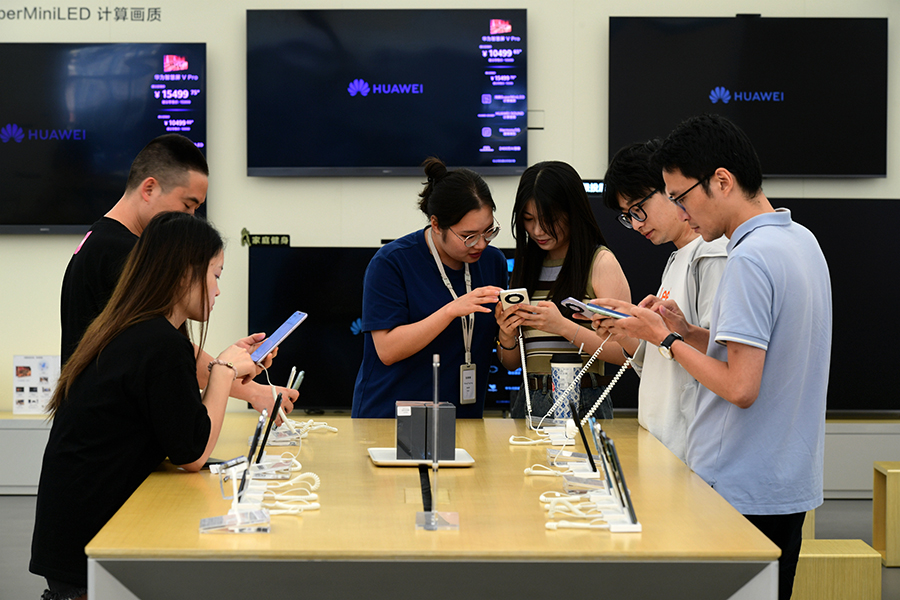US cannot deprive China of right to development

Shoppers try out Huawei's Mate 60 Pro smartphones at a store in Jinhua, Zhejiang province. SHI BUFA/FOR CHINA DAILY
Politicians in Washington claimed just a few months ago that Huawei's production of 5G smartphones had come to a halt as all channels for China to access advanced chips, as well as relevant devices and technologies to enable it to make the chips, are effectually blocked by the United States.
If they truly think it is possible to thwart China's progress in technology through export controls, they will experience more such shocks as those caused by the launch of the Mate 60 Pro, Huawei's latest smartphone.
Although the 7-nanometer processor the device contains, seemingly produced by SMIC, China's top chipmaker, still lags a generation behind the 5-nanometer chips that are universal in US tech, it suffices to put Washington on notice that China will not be thwarted. Occupying the top of the global supply chains does not necessarily mean the US can obstruct other countries making breakthroughs, as if none of them can seek innovations without US know-how.
Yet instead of reflecting on the unjustness and infeasibility of the US' export controls, these anti-China politicians organize security, technology and trade experts to analyze the new 5G Kirin 9000s processor of the device to try and determine how Huawei came by such a chip following the sweeping efforts by the US to restrict China's access to it.
US National Security Advisor Jake Sullivan said, at a news conference following the launch of the Huawei device, that the US needs "more information about precisely its character and composition" to determine if parties bypassed US restrictions on semiconductor exports to create the new chip. That means instead of rethinking the rationality of its de facto technology blockade, the US is intent on trying to find and plug the loopholes in it.
Regrettably, despite US Commerce Secretary Gina Raimondo's visit to China late last month, which was seen as a sign the Joe Biden administration was trying to ease tensions in bilateral trade relations, the US has conveyed an unmistakable message that it will further strengthen its China-targeted export restrictions. An anonymous US Commerce official told the media, "Let's be clear: Export controls are just one tool in the US government's toolbox to address the national security threats presented by the PRC."
Washington overestimates its own capabilities and underestimates China's. The country's fast development and its advancement in science and technology have always been realized against adversity over the past more than seven decades. The nation's determination and ability to stand on its own two feet, and make scientific and technological innovations today should never be doubted.
It is the US that refuses to accept and face fair competition with China. Washington cannot deprive other countries of their right to development. If China's opposition to coercion, bullying, containment and repression in the name of competition can be smeared as an irresponsible move to break the "rules-based order", the onus is on Washington to explain on what grounds China should resign itself to the US' arrangement.
Photos
Related Stories
- Removal of tariff on U.S. apples won't affect sales of domestic varieties: Indian official
- Waiting for the collapse of the 'China collapse' prediction
- Building "small yard, high fence" will eventually backfire on U.S.
- Network hegemony
- Interview: U.S. hegemony threatens global security, stability, development: Serbian expert
- U.S. House speaker calls for impeachment inquiry into Biden
- U.S. Congress needs to act accordingly over cost of wars: The Hill
- Iran says holding indirect nuclear talks with U.S. possible
- U.S. Hawaii's Kilauea volcano erupts again
- Trump demands recusal of U.S. judge in 2020 presidential election subversion case
Copyright © 2023 People's Daily Online. All Rights Reserved.









